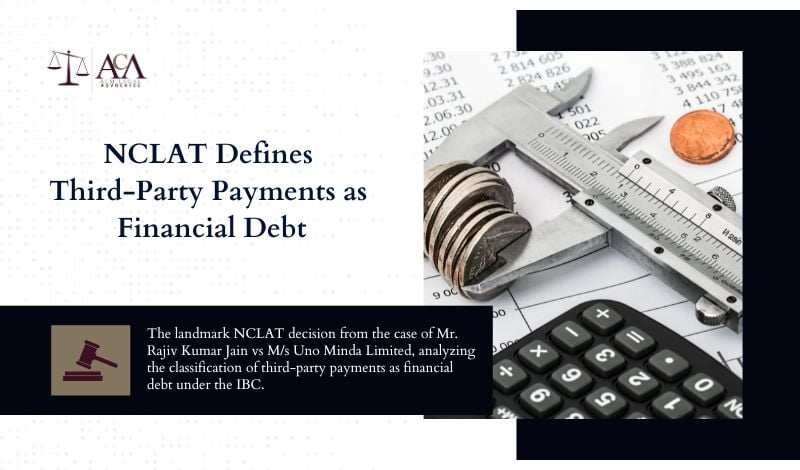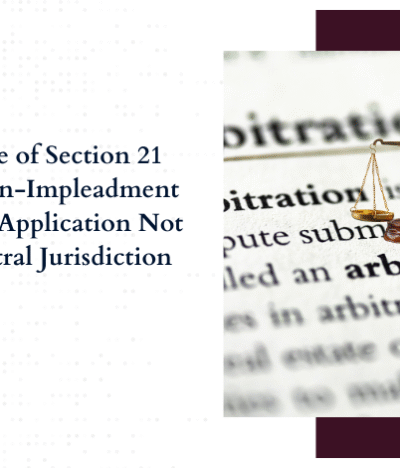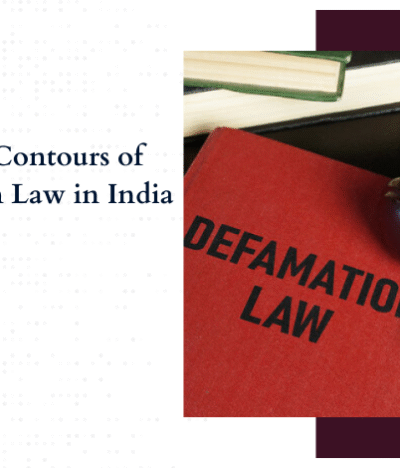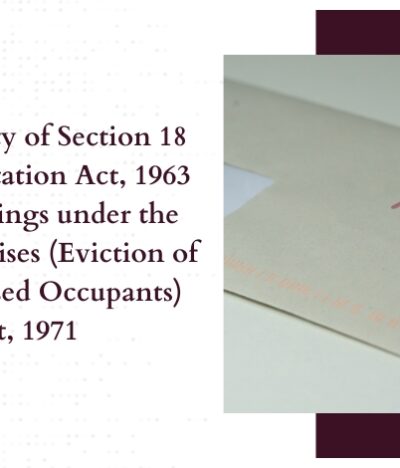The National Company Law Appellate Tribunal (‘NCLAT’) New Delhi in the case of Mr. Rajiv Kumar Jain vs M/s Uno Minda Limited (Case No. 947 of 2022 & I.A. No. 2682, 2683 of 2022 & 1652 of 2023) provided a critical analysis regarding the classification of payments made by third parties for corporate debtors to obtain raw material or working capital.
In this case, NCLAT unequivocally pronounced such payments as “financial debt” within the purview of the Insolvency and Bankruptcy Code (‘IBC’). By recognizing payments made by third parties as financial debt, the tribunal has effectively expanded the ambit of liabilities subject to insolvency proceedings, thereby increasing the protection afforded to creditors and streamlining the resolution process for distressed corporate entities.
Facts of the Case
An appeal was filed by Mr. Rajeev Kumar Jain, one of the ex-director and shareholders of M/s. Unicast Autotech Private Limited (‘Corporate Debtor’) against an order passed by the NCLT, New Delhi, which admitted Uno Minda’s (‘Respondent 1’) petition under section 7 of the Insolvency and Bankruptcy Code (IBC) and initiated the Corporate Insolvency Resolution Process (CIRP) against the Corporate Debtor.
Unicast Autotech Private Limited was engaged in the business of manufacturing aluminium die casts, and Uno Minda Limited was engaged in the business of supplying automotive solutions to original equipment manufacturers (OEMs).
A Business Support Agreement (BSA) dated 17.04.2021 was agreed between the Corporate Debtor and its Promoters, including Mr. Rajeev Kumar Jain (Appellant), and Respondent 1. The purpose of this agreement was to facilitate the sale of a 100% stake in the Corporate Debtor and to provide funding for raw materials and critical working capital requirements. It was decided that all the money lent to be treated as unsecured debts to the Corporate Debtor only payable by the Promoters.
The Appellant stated that the Promoters & M/s Kiran Udyog Private Limited (jointly termed as ‘Promoters Group’) placed their entire shareholding in the Corporate Debtor vide Share Pledge Agreement dated 12.05.2021 (‘SPA’). The Promoters Group issued the deed of guarantee dated 14.05.2021 in favour of Respondent 1 and thus all the transactions were happening between promoters and Respondent 1 and no financial assistance was availed by the Corporate Debtor. Between April and May 2021, the Corporate Debtor purchased goods amounting to Rs. 1.5 crore, but was unable to pay the same due to financial distress. On 06.12.2021, Respondent 1 filed an application for a Corporate Insolvency Resolution Process (‘CIRP’) against the Corporate Debtor, which was approved by the NCLT, New Delhi.
Contentions of the Appellant
The transactions were between Respondent 1 and the Promoters and no financial assistance was availed by the Corporate Debtor Therefore, there is no basis for initiating a Corporate Insolvency Resolution Process (CIRP) against the Corporate Debtor. Hence, any obligations arising from the BSA should be borne solely by the Promoters, and there is no liability on the part of the Corporate Debtor.
Contentions of the Respondent
- It was submitted that Respondent 1 provided the working capital required for raw material to the Corporate Debtor and on behalf of the Corporate Debtor and at his instruction Respondent 1 was making payments, as such it was clearly financial debt.
- The funds provided by Respondent 1 were crucial for the operations and financial health of the Corporate Debtor. Therefore, the Corporate Debtor is liable for repayment of the debt owed to the Respondent 1.
Analysis of the case by NCLAT
Upon examination of the contractual agreements between Respondent 1 and the Promoters of the Corporate Debtor, the NCLT considered the provisions of the Business Support Agreement (‘BSA’) and whether the funds provided by Respondent 1 were essential for the Corporate Debtor’s operations. The NCLT focused on determining whether the debt owed by the Corporate Debtor to Respondent 1 qualified as “financial debt” under the IBC. This determination would have significant implications for the initiation of the CIRP against the Corporate Debtor.
The Main Issue of the Case
Whether this is a “financial debt” or an “operational debt”.
NCLT ruled in favour of Respondent 1, upon analysing that the funds provided by Respondent 1 were crucial for the Corporate Debtor’s operations and constituted financial debt under the IBC. The NCLAT held that the payment of raw material made by a third party at the instructions of a Corporate Debtor or financial assistance towards working capital constitutes ‘Financial Debt’ under IBC. Therefore, the NCLT concluded that there was a valid basis for initiating CIRP against the Corporate Debtor. This decision enables Respondent 1 to pursue the resolution of the debt owed to it through the insolvency resolution process under IBC.
Judicial Interpretation
In this case, the NCLAT made a significant interpretation regarding the classification of payments made by third parties for corporate debtors. The tribunal ruled that such payments, specifically for raw material or working capital, should be considered as “financial debt” under the IBC.
This interpretation is crucial because it expands the scope of what constitutes financial debt under the IBC. By categorizing these payments as financial debt, the tribunal essentially brings them under liabilities that can trigger insolvency proceedings.
The grounds behind this interpretation stem from the recognition that third-party payments for essential business needs like raw materials and working capital are integral to the financial health and viability of a business. Therefore, treating them as financial debt ensures that they are given appropriate priority and protection within the insolvency resolution process. This judicial interpretation provides clarity on the treatment of such payments in the context of corporate insolvency, helping to streamline the resolution process and provide better protection for creditors and stakeholders.
Conclusion
The judgment provides clarity on the interpretation of financial obligations under the IBC by ruling that funds provided by a third party for essential operational needs constitute “financial debt” under the IBC. It reaffirms the principle of equitable treatment of creditors in insolvency proceedings which protects the creditor’s rights and interests in promoting confidence in the insolvency resolution process. As a landmark ruling, this judgment serves as a precedent for future decisions. It provides a framework for interpreting the IBC and addressing complex legal issues related to financial transactions in insolvency proceedings.






